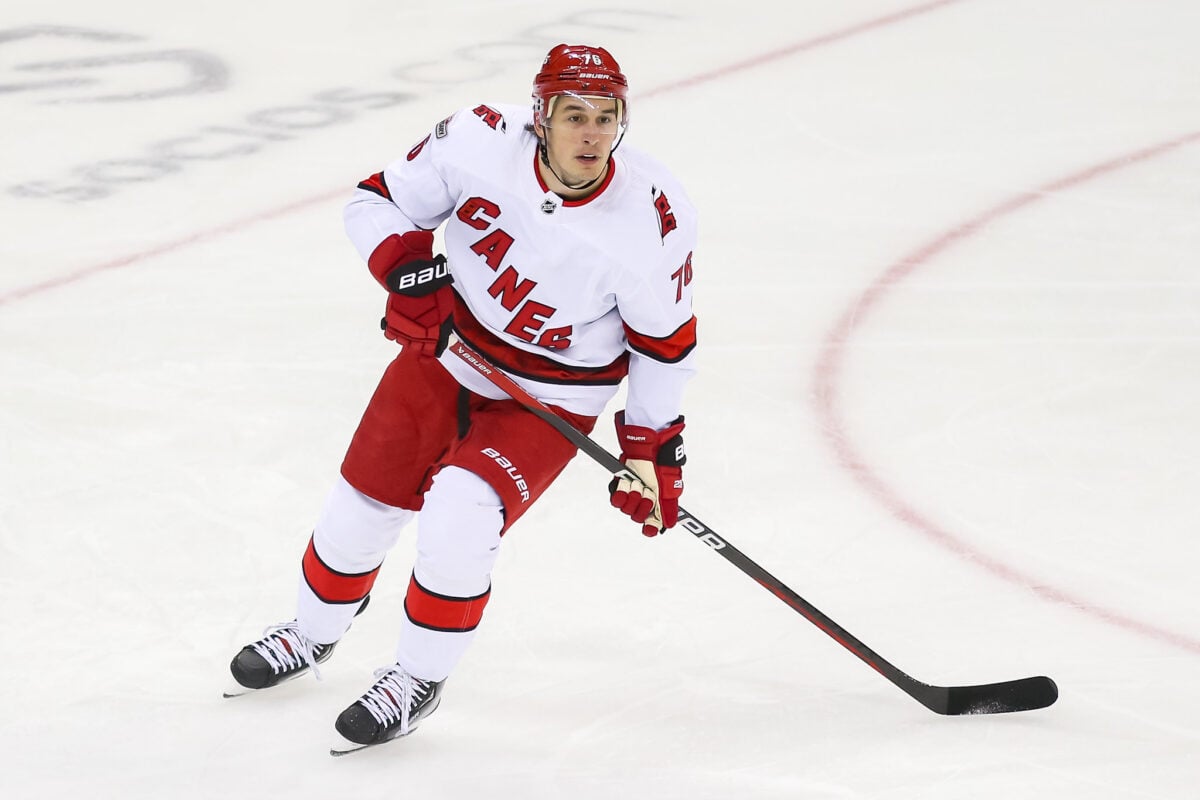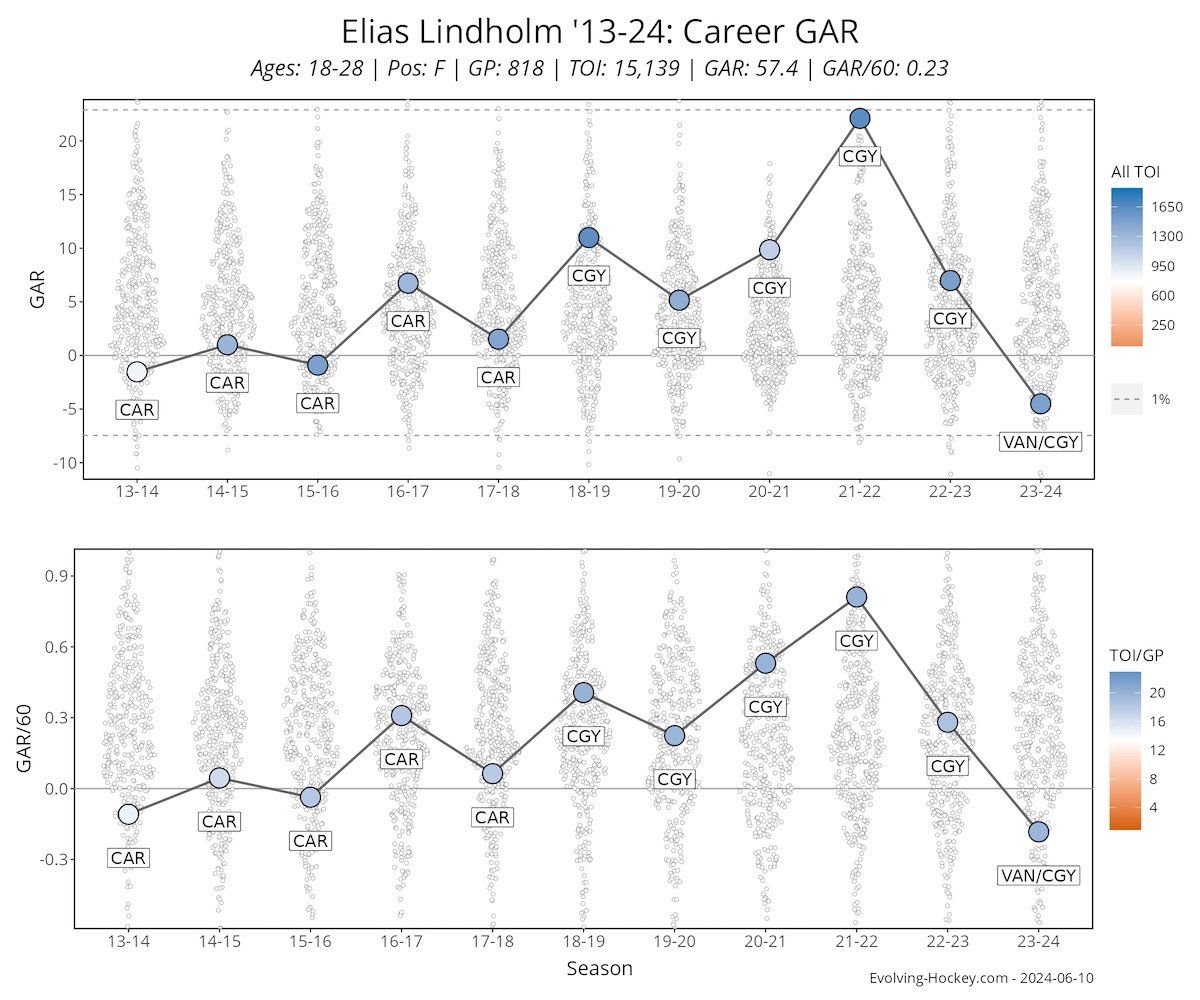As long as seven- and eight-year max-term deals exist in NHL free agency, questionable contracts will always get handed out on July 1. This year, especially with a talented free-agent class, will not be any different. Let’s look at seven unrestricted free agents teams should be wary of pursuing this offseason.
Brady Skjei
Brady Skjei came into his own during his time with the Carolina Hurricanes. Now, a payday awaits if the Hurricanes don’t re-sign him in the next few weeks. He finished this past season with 13 goals and 47 points in 80 games while logging just over 21 minutes of ice time per game. At worst, he’s a second-pair defender, but he can play higher up the lineup.
Helping Skjei this summer is that there are not many quality left-handed defensemen available in free agency. Nikita Zadorov is probably his main competition, but they’re two completely different defensemen, so that might not affect Skjei’s market much. That means any team looking for a left-handed shot who can move the puck efficiently will target Skjei.

Evolving Hockey has Skjei projected for a seven-year deal at a cap hit of $7.498 million, while AFP Analytics has him signing for five years at a cap hit of $7.465 million. Five years might be tolerable for Skjei, but even then, he just turned 30 in March. A five- to seven-year pact for a defender already on the wrong side of 30 seems like a problem contract waiting to happen.
Matt Duchene
Matt Duchene was a feel-good story with the Dallas Stars this season after getting bought out by the Nashville Predators last summer. He had one of the best-value contracts in the NHL in 2023-24 (one year, $3 million). But now, he could get one of the summer’s worst contracts if the Stars don’t re-sign him.
Duchene is still a good player, even a very good one. He finished with 25 goals and 65 points in 80 games this season, so you can’t ask for much more than that on a one-year contract with a $3 million cap hit. None of Duchene’s underlying numbers suggest a massive dropoff in his game is imminent, but he is 33, and you never know when a decline can begin.
There is quite a discrepancy between AFP and Evolving Hockey’s contract projections. AFP has Duchene landing a three-year deal at a cap hit of $4.312 million. That’s certainly acceptable, but given his resumé, that seems like an absolute bargain. Evolving Hockey has Duchene signing for three years and $7.046 million annually, and I think that’s closer to what he’ll get. For that price, I would stay away from him. Even for three years, that’s a significant cap hit to add to the books for a 33-year-old.
Sam Reinhart
Talk about a time to have a career year. Sam Reinhart put up some outrageous numbers with the Florida Panthers, finishing with 57 goals and 94 points in 82 games. Those 57 goals shattered a career-high, and he will cash in on that. If he doesn’t re-sign with the Panthers, he will likely be the highest-paid UFA this summer.
The problem here is Reinhart is very unlikely to repeat his 2023-24 season. He shot 24.5 percent and is a 15.6 percent shooter for his career, meaning regression is in store for him next season. Reinhart has proven in his career that he can score 30 goals and close to a point per game, but the price of his next contract will be worth much more than that.
Related: Predicting 9 UFA Contracts for 2024 Free Agency
AFP has Reinhart projected for an eight-year deal with a cap hit of $11.284 million (eight years seems to assume he stays with the Panthers). Evolving Hockey’s projection is similar, as they have Reinhart signing for seven years and $10.89 million annually.
It wouldn’t shock me if the Panthers could get him at a lower number because 1) there’s no state income tax in Florida. Two) There’s the hometown discount or whatnot, especially since they’re in the Stanley Cup Final for the second consecutive year. But if he hits the open market, his next contract will likely be extraordinary. Anything with a cap hit of eight figures will be problematic, and it’s unlikely any team interested in him can avoid signing him to that.
Elias Lindholm
If there’s a candidate for potential worst contract handed out on July 1, it’s Elias Lindholm. His play has significantly declined since he posted 42 goals and 82 points in 2021-22. This past season, he finished with just 15 goals and 44 points in 79 games between the Vancouver Canucks and Calgary Flames.
Though Lindholm played well in the playoffs for the Canucks, don’t get fooled by that. His underlying numbers have had a steep dropoff over the last two seasons. That dropoff is better visualized when looking at his career goals above replacement (GAR) chart from Evolving Hockey:

One thing for sure is that his 2021-22 season was an outlier. That was likely a product of playing on a line with Matthew Tkachuk and Johnny Gaudreau, who had career years themselves. But his GAR falling into the negative range this past season instead of trending back upward should be a big red flag to any team with interest in Lindholm.
Evolving Hockey has Lindholm projected for a seven-year deal at a cap hit of $7.935 million, while AFP has him landing a five-year contract at a cap hit of $6.765 million. I would stay far away from him for either of those prices, because it looks like his best days might be behind him.
Brandon Montour
Like Skjei with the Hurricanes, Montour has come into his own during his time with the Panthers. He posted a career-high 16 goals and 73 points in 80 games in 2022-23 and has averaged 50 points per 82 games in his three-plus seasons with the Panthers.
Montour has earned his payday, but there’s a good chance whichever team signs him (if it’s not the Panthers) will overpay for him. AFP has Montour projected for a six-year deal at a cap hit of $7.7 million, while Evolving Hockey has him at a three-year contract and a cap hit of $6.483 million.
Evolving Hockey’s deal is perfectly reasonable for Montour. If that’s what he gets, the team that signs him shouldn’t have many issues moving forward. But if he gets six years and $7.7 million annually — which seems more likely — that could cause problems moving forward, even with the cap projected to continue robust growth over the next few years.
Montour is a good player, but $7.7 million annually is top-pair defenseman money. Is he that? I would argue no. He’s also never been this productive in his career outside of Florida, so would that continue on another team? That’s also a fair question to ask.
Dakota Joshua
Dakota Joshua had a breakout year, producing at a 23-goal pace over 82 games. However, his microstats suggest his 23-goal pace was likely a fluke. He ranked in the 90th percentile in goals, but all his shooting metrics were in the red. Plus, he shot an unsustainably high 21.4 percent, so there was definitely some luck in his breakout season:

Joshua’s contract projections from AFP and Evolving Hockey aren’t particularly burdensome. Evolving Hockey has him signing a two-year deal at a cap hit of $2.049 million, while AFP has him earning a contract of four years at a cap hit of $3.252 million.
A two-year deal for Joshua isn’t trouble, but I could see how signing him for four years might be, especially since I don’t believe what he did this year was sustainable. Plenty of quality bottom-six forwards available in this year’s UFA class have the track records to suggest their results are sustainable, so I would stay away from Joshua if you’re a team looking to beef up your bottom six.
Nikita Zadorov
I love everything about Zadorov’s game. He’s a physical defensive defenseman who actually puts up excellent defensive results, which isn’t always the case for blueliners with his makeup. Not only does he defend well, but he’s also a highly underrated puck-moving defenseman, even though he doesn’t put up many points.
Because the market for defensemen like Zadorov is so thin this summer, I’d bet money that some team will end up overpaying for the 6-foot-6, 240-pound defender. His contract projections aren’t terrible — three years and just over $4 million annually from Evolving Hockey and five years and a cap hit just above $5.2 million from AFP.
Three years and $4 million annually seems like the low end of what Zadorov gets this offseason if he tests the market and doesn’t return to the Canucks. Even though AFP’s projection is closer to what I think he’ll get in free agency, it would not shock me if he gets more.
Frank Seravalli has hinted on a couple of episodes of DFO Rundown that Zadorov could get a six-year deal of around $6 million annually. Would that be the worst contract ever handed out in free agency? No, but for a player who plays a hard game like Zadorov, the back half of that deal could look pretty ugly if he starts to decline. As much as I love what he brings to the table, I would stay away from giving him a 6×6 deal.
We’ll see what July 1 brings, but some poor contracts will get handed out. That’s the nature of free agency. Will these be the worst? Time will tell.
* * *
Advanced stats from Evolving Hockey
